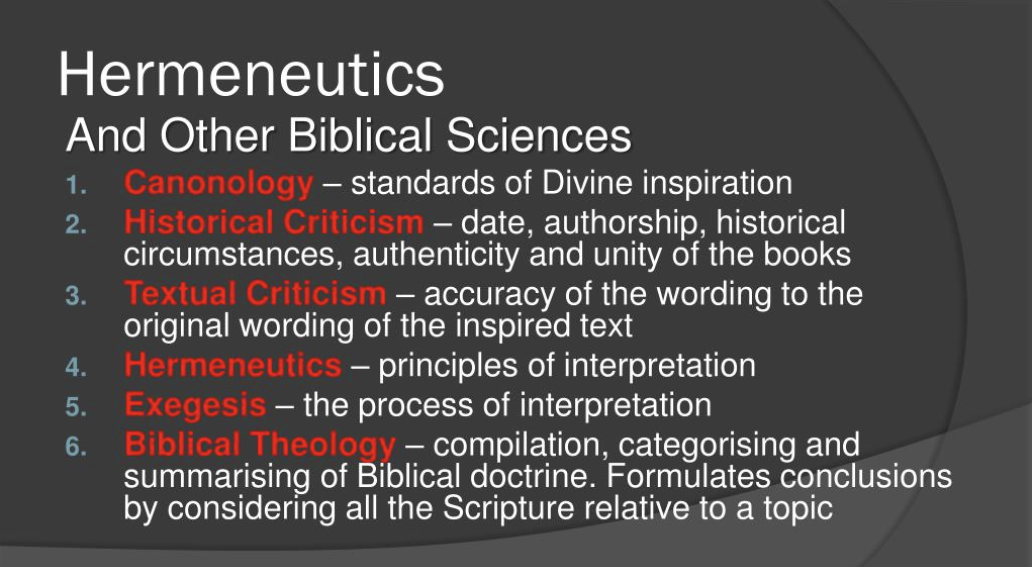Introduction
Hermeneutics, derived from the Greek word hermeneuo, meaning “to interpret,” is the art and science of interpreting texts. In the context of the Bible, hermeneutics plays a fundamental role in unlocking its timeless truths and guiding believers in understanding God’s revelation. This article explores the concept of hermeneutics as applied to the Bible, examining its principles, methods, and significance in biblical interpretation.
- Principles of Hermeneutics: At its core, hermeneutics is guided by several key principles that shape the interpretation of biblical texts. These principles include:
- Context: Understanding the historical, cultural, and literary context in which a passage was written is essential for grasping its intended meaning.
- Authorial Intent: Discerning the author’s original purpose and message is paramount in interpreting Scripture accurately.
- Literal vs. Figurative Language: Recognizing the literary genre and distinguishing between literal and figurative language helps avoid misinterpretation.
- Unity of Scripture: Acknowledging the cohesive message of Scripture ensures harmony in interpretation across various passages and books.
- Methods of Biblical Interpretation: Hermeneutics employs various methods to analyze and interpret biblical texts, each serving a distinct purpose in uncovering their meaning. These methods include:
- Exegesis: The systematic study of biblical passages to uncover their original meaning through careful analysis of language, historical context, and cultural background.
- Historical-Critical Method: Examining the historical context, authorship, and literary features of a text to understand its original meaning and significance.
- Typology: Identifying patterns, symbols, and foreshadowings in Scripture to discern deeper spiritual truths and connections between Old and New Testament passages.
- Allegorical Interpretation: Exploring symbolic or metaphorical meanings in biblical narratives to uncover moral or spiritual lessons applicable to contemporary life.
- Significance of Hermeneutics in Biblical Interpretation: Hermeneutics plays a crucial role in biblical interpretation by providing a systematic framework for understanding and applying Scripture. Its significance is evident in several aspects:
- Authority of Scripture: Hermeneutics upholds the authority of God’s Word by facilitating accurate interpretation grounded in its original meaning and context.
- Spiritual Growth: By guiding believers in uncovering the riches of Scripture, hermeneutics fosters spiritual growth and maturity, enabling individuals to apply biblical truths to their lives.
- Unity of the Church: Hermeneutics promotes unity within the Body of Christ by providing a common methodology for interpreting Scripture, despite differing theological perspectives.
- Relevance to Contemporary Issues: Applying hermeneutical principles allows believers to address contemporary issues and challenges by drawing insights from the timeless wisdom of Scripture.
Conclusion
Hermeneutics serves as the foundation for interpreting and understanding the Bible accurately. By adhering to principles such as context, authorial intent, and the unity of Scripture, believers can delve into the depths of God’s Word and glean its timeless truths for their lives. Hermeneutics not only enriches biblical scholarship but also guides individuals in their journey of faith, enabling them to apply the transformative power of Scripture to their daily lives and communities.
As Romans 12:2 aptly states, “Do not conform to the pattern of this world, but be transformed by the renewing of your mind. Then you will be able to test and approve what God’s will is—his good, pleasing and perfect will.” This verse encapsulates the essence of hermeneutics in biblical interpretation, emphasizing the need for spiritual renewal and transformation through the study and application of Scripture. Through the diligent application of hermeneutical principles, believers can discern God’s will and experience His transformative work in their lives, leading to a deeper understanding of His truth and a closer walk with Him.
The saying “eat the meat, and spit out the bones” is often used among Christians to encourage discernment in consuming spiritual teachings. While it holds some truth, caution is warranted as consuming spiritually harmful material can lead to doctrinal compromise. Just as undercooked or spoiled meat poses risks, consuming erroneous teachings, even if some elements seem beneficial, can lead to spiritual harm. Additionally, discerning between truth and error requires biblical knowledge and maturity, as blindly following such advice can lead to doctrinal confusion. Rather than relying on catchy sayings, Christians are urged to diligently study Scripture and think biblically to safeguard against spiritual compromise in an age of shallow and apostate teachings.



